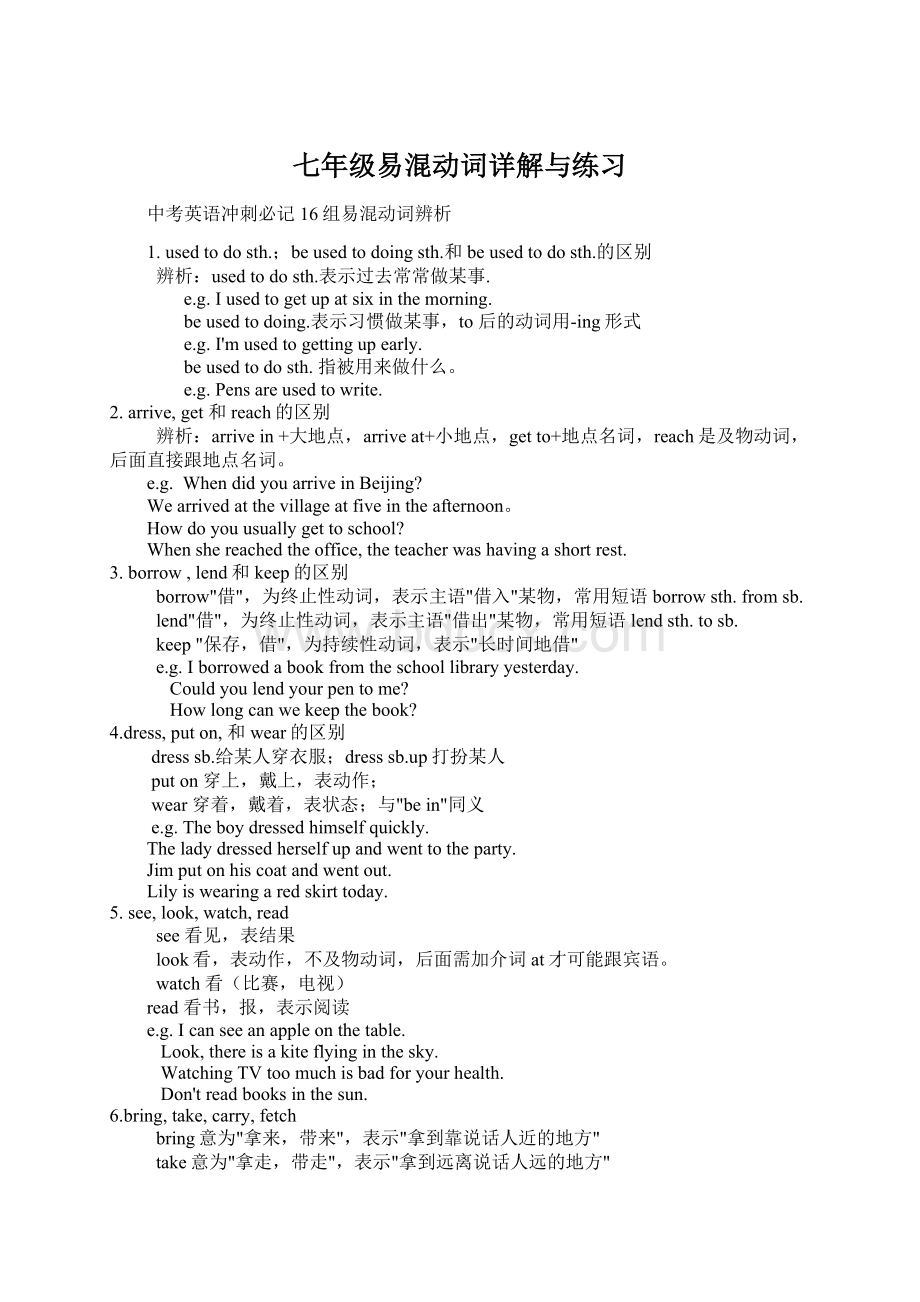七年级易混动词详解与练习Word文档下载推荐.docx
《七年级易混动词详解与练习Word文档下载推荐.docx》由会员分享,可在线阅读,更多相关《七年级易混动词详解与练习Word文档下载推荐.docx(18页珍藏版)》请在冰豆网上搜索。

Howlongcanwekeepthebook?
4.dress,puton,和wear的区别
dresssb.给某人穿衣服;
dresssb.up打扮某人
puton穿上,戴上,表动作;
wear穿着,戴着,表状态;
与"
bein"
同义
e.g.Theboydressedhimselfquickly.
Theladydressedherselfupandwenttotheparty.
Jimputonhiscoatandwentout.
Lilyiswearingaredskirttoday.
5.see,look,watch,read
see看见,表结果
look看,表动作,不及物动词,后面需加介词at才可能跟宾语。
watch看(比赛,电视)
read看书,报,表示阅读
e.g.Icanseeanappleonthetable.
Look,thereisakiteflyinginthesky.
WatchingTVtoomuchisbadforyourhealth.
Don'
treadbooksinthesun.
6.bring,take,carry,fetch
bring意为"
拿来,带来"
,表示"
拿到靠说话人近的地方"
take意为"
拿走,带走"
拿到远离说话人远的地方"
carry意为"
扛,搬"
,用力移动,没有方向性,
fetch意为"
去取,去拿"
表示往返拿物。
e.g.Pleasetakethebookstotheclassroom.
Remembertobringyourhomeworktoschooltomorrow.
Thebagisveryheavy,pleasecarryittomyoffice.
She'
sgonetofetchthekidsfromschool.
7.die,dead,death,和dying的区别
Die意为"
死"
,是不及物动词,非延续性动词;
Dead意为"
死的"
,是形容词,表状态;
Death意为"
,是名词;
Dying意为"
垂死的,要死的"
,是形容词。
e.g.Hergrandfatherdiedlastyear.
Hergrandfatherhasbeendeadfortwoyears.
HisdeathwasagreatlosstoChina.
Thepooroldmanwasdying.
8.speak,say,talk和tell的区别
speak作为及物动词表示语言的名词或只在会议上发言;
say常跟直接引语或间接引语,并且表示说的内容;
talk是不及物动词,常跟介词to或with,意为"
同某人谈话"
,也表示具有说话的能力
tell意为"
告诉"
并常与story连用,意为"
讲故事"
9.spend,take,pay,cost
Spend只花费时间或金钱,后接onsth.或(in)doingsth.;
Cost物做主语,意为"
值多少钱"
Take可用固定句型表示花费时间、金钱,其结构为:
It+takes+时间/金钱+todosth,
Pay与介词for连用
10.Lookfor,find
两个词都有找的意思。
Lookfor强调寻找的过程,find强调寻找的结果。
11.Listento,hear
Listento和hear都有"
听"
的意思。
Listen为不及物动词,与to构成固定搭配,强调听的动作;
hear强调听的结果。
12.hung,hanged
两个词同为hang过去分词,hung意为"
悬挂"
,而hanged意为"
绞死"
。
13.lose,fail,beat,win
Lose"
输给某人"
losetosb
Fail"
失败"
Beat"
打败"
beatsb.或某支队伍
Win"
赢得"
,如何赢得荣誉,比赛,地位等。
14.Lose,forget,leave
Lose意为"
丢失,失去"
Forget"
忘记"
后可跟不定式和动名词
Leavesth.+地点"
把某物落在某处"
15.thinkof,thinkabout,thinkover
Thinkof"
想到…"
Thinkabout"
考虑"
宾语it或them置后
Thinkover"
仔细考虑"
,宾语it或them放在中间,一般指考虑问题。
16.Join,takepartin,attend
三个词都表示"
参加"
Join一般指加入"
党派"
或组织,如参军,入党等
Takepartin只参加聚会活动;
Attend一般指出席会议
易混动词(词组)练习题集锦
l.It_____meoneandahalfhourstogettherebybus.
A.spentB.tookC.usedD.paid
2.TheYoungPioneer______waterfortheoldmaneveryday.
A.fetchesB.bringsC.takesD.carries
3.-Don’tkeepyourmother_____long.
–No,Iwon’t.
A.waitB.waitingforC.waitforD.waiting
4.Anewkindofcomputer______lastmonth.
A.inventedB.wasinventedC.discoveredD.wasdiscovered
5.Theteacherhadtheboys______thousandsoftreesonthehilllastyear.
A.plantB.plantedC.toplantD.planting
6.Ican______youmydictionary,butyoucan______itforonlyaweek..
A.borrow,lendB.lend,borrowC.lend,keepD.keep,lend
7.LastweekIwasillfortwodays.I_______somelessons.
A.gotB.hadC.missedD.lost
8.Themandoesn'
tknowhowto______thiswordinEnglish.
A.speakB.tellC.talkD.say
9.We'
llgoto______afilminsteadof______abookinbed.
A.read;
lookB.see;
readC.see;
readingD.watch;
lookat
10.Whenwe______therailwaystation,thetrainhadalreadyleft.
A.arriveatB.reachedinC.gottoD.arrivedin
11.—______you_____thepillsyet?
—No.I’mallrightnow.
A.Do;
eatB.Do;
takeC.Have;
eatenD.Have;
taken
12.Man-madesatelliteshavebeen_____intospacebymanycountries.
A.sentoutB.sentupC.sentoffD.sentfor
13.Theyall_______megoodluckwhenIleaveforShanghai.
A.hopeB.wishC.expectD.want
14.Don’tforget_________yourdictionaryherewithyounexttime.
A.togetB.tobringC.takingD.carrying
15.–Myparents_____ever_____Canada.
–Really?
Whendidtheygothere?
A.havegonetoB.havebeeninC.havebeenfromD.havebeento
16.–Where______Tom______?
–Hehasleftamessagesayingthathehassomethingimportanttodo.
A.has,goneB.has,beenC.has,beeninD.did,go
17.Hetoldmethatthesun______intheeast.
A.risesB.raisesC.roseD.raised
18.Doyouliketo____clothesoflightcolorsordarkcolors?
A.putonB.dressC.wearD.bein
19.Shetellsmethatherbrother____theteamformorethanthreeyears.
A.hasbeeninB.hasjoinedC.hasgonetoD.hasbecomeamemberof
20.Wouldyoupleasebekindenoughto____theTValittle?
I’mdoingmyhomework.
A.turnupB.turnoutC.turndownD.turnoff
21.I’mafraidIcan’t____alltheflowersandtreesinyourbackgarden.
A.sayB.talkC.speakD.name
22.Willyoupleasestop____?
Ican’t_____anything.
A.talking;
listenB.totalk;
hearC.talking;
hearD.totalk;
listen
23.I’veboughtawatchforherandnowshe____ittoworkeveryday.
A.hasB.putsonC.dressesD.wears
24.Haveyou____toswimyet?
Whataboutgoingforaswim?
A.studiedB.taughtC.learnedD.liked
25.Howmanypigsdoyourparents____?
A.growB.plantC.makeD.keep
26.Tom______carefullybutcould____nothing.
A.listened,hearB.heard,listentoC.listenedto,listenD.heard,hearfrom
27.—Didyouhaveanyone______theflowers?
—Yes,Ihadtheflowers______.
A.towater;
waterB.towater;
wateredC.water;
tobewateredD.water;
watered
28.Don’tforget_______thewindowwhenyouleave.
A.closingB.tocloseC.closeD.closed
29.Hecriedsohard,it_____thathehadlostonemilliondollars.
A.lookedB.asifC.appearsD.seemed
30.—IhadalittleaccidentlastSunday.
—Oh,What______?
A.tooktheplaceofB.wastakenplaceC.tookyourplaceD.happened
31.Englishis______aforeignlanguageinChina.
A.usedforB.usedbyC.usedasD.usedto
32.Theyaregoingto______theboyinnewclothesandtakehimtothepark.
A.dressB.wearC.haveonD.puton
33.Jill______thearmyin1942and______manyfightssincethen.
A.joined;
joinedB.tookpartin;
hasjoined
C.tookpartin;
hasjoinedD.joined;
hastakenpartin
34.Thevisitorsarevery______toseesomanychanges_______inNanchangsince1979.
A.surprise;
havebeentakenplaceB.surprising,tookplace
C.surprised,havebeentakenplaceD.surprised,havetakenplace
35.Please_______whenthetrainleaves.
A.lookB.findoutC.findD.lookfor
36.Thelittlewas_______thecatwhilehermotherwas_____thepiano.
A.playing;
playing
B.playing;
playingwith
C.playingwith;
playingD.playingwith;
37.I’dpreferyou______himup.
A.notringB.notringingC.nottoringD.isn’tringing
38.Thisskirtis_______silkandis_____Zhejiang.
A.madefrom;
madebyB.madefor;
madein
C.madeof;
madeinD.madeof;
madeby
39.TheParty_______onJuly1,1927.
A.wasfoundB.foundC.foundedD.wasfounded
40.Ifyou______him,youwill_______thismatch.
A.win;
beatB.win;
winC.beat;
winD.beat;
win
答案详解:
1.选B。
通过观察、比较四种花费,不难发现这是在考查句式Ittakes/tooksb.sometimetodosth.,而I______halfanhouronmyhomeworkyesterday.应套用sb.spend…onsth.句式。
2.选D。
bring从远处把某物拿到跟前;
take…(with)随身带上某物,即物就在旁边;
通过用力搬运、扛、抬等,那是carry的能力范围;
fetch去把某物拿来,强调的是“去、回”双线行为。
3.选B。
keepsb.doingsth.表示“让某人持续做某事”,V-ing形式不能换成其它的形式;
wait后接宾语时才带for,但题中的for是属于forlong的。
4.选B。
通过分析句子,新式电脑是“invent发明”,不应是“discover发现”;
本句还要注意用一般过去时的被动语态。
5.选A。
因为havesb.dosth.是个固定搭配,意为“让某人做某事”;
但是在另外一种情境中,D却可能是正确答案,即get/start/leave/keep/findetc.+宾语+现在分词——这时的现在分词表示“一段时间里一直在进行的动作”。
如:
Thetrainerhadtheplayerrunningroundthefield.教练让队员绕着运动场跑。
6.选C。
lend的意思是“借出,把某物借给别人”;
borrow意为“借进,向某人借”;
borrow,lend都是短暂性动词,在肯定句中从不与时间段交往,故借一段时间,一般只用keep。
7.选C。
因生病未上学而“缺课”的,即notsee/have,而lose是“失去、丢失”,即某人或某实物不见了。
8.选D。
说某种语言,一般请speak出马,但saysthinEnglish/Chinese是另类时尚:
用英语说……。
9.选C。
看电影的“看”与看书、报的“看”,生来有别:
seeafilm,readbooks/newspaper!
而look(at)则是一般的眼看;
本题因of是介词,所以read还得换装成动名词!
10.选C。
“到达”有讲究,arrive是不及物动词,想接宾语要拉上at或in作中介——arriveat后较小的地点,arrivein要接较大的地点;
getto多用于口语中,相当于及物动词,当后接地点副词时,要省去to;
reach是个及物动词,可直接跟宾语。
11.选D。
因问句后有yet作暗示,故本题要用现在完成时态,pills(药片)的“服”用应是“take”的职责。
12.选B。
四词组的含义分别是:
sendout送出、寄出;
sendup发射、发出;
sendoff(=seeoff)送行;
sendfor派人去请。
13.选B。
“祝愿某人好运”,一般都用wish,特别是用goodluck/nicetrip/happynewyear之类的词作宾语补足语时。
14.选B。
forget后如用不定式则表示“忘记了干某事”,即事未做;
而后接V-ing形式时,却表示“做了某事,但忘了”,即事已做;
把某物从远处带来,一般用bring,不用take,如不是很重的东西,不需carry帮忙。
15.选D。
因ever在暗示,myparents是说话前曾到过加拿大,现人已回来,故用havebeento。
16.选A。
很明显,Tom应不在说话地,所以是“hasgone(to)已去……了”。
17.选A。
尽管主句的时态是过去时,但客观事实作宾语从句,仍用一般现在时;
rise是不及物动词,而raise才是及物动词,能接宾语,故选A。
18.选C。
puton意思是“穿上”、“戴上”,指动作的全过程;
dress为及物动词,是“穿好”的意思,后常接反身代词或代词(指人);
wear的意思是“穿着、戴着”,主要表示穿的状态,bein的意思与wear很接近,为系表结构。
19.选A。
因题后有“formorethanthreeyears”,得知该题要用现在完成时,且动词须是延续性的,但join,go,become都是非延续性动词,只bein有此能耐。
20.选C。
我在做作业(I’mdoingmyhomework),不想被电视吵,所以请求看电视的人“turndown关小”声音。
21.选D。
要把所有的花与树名叫出,我恐